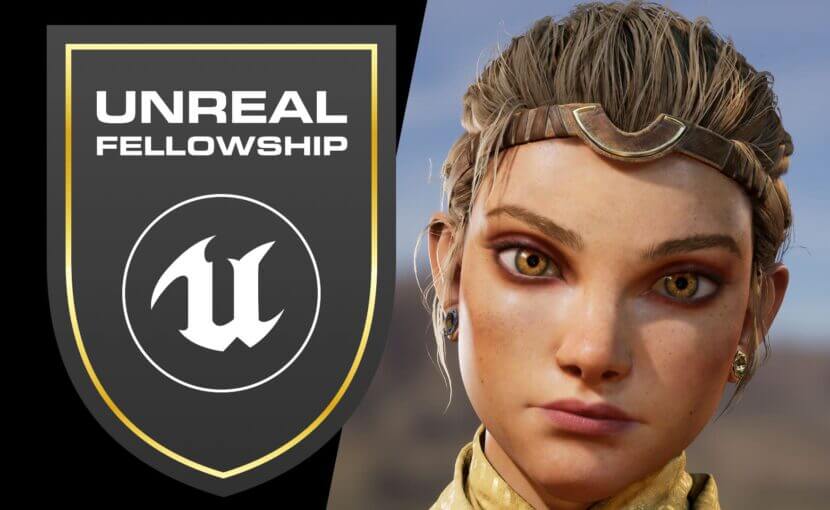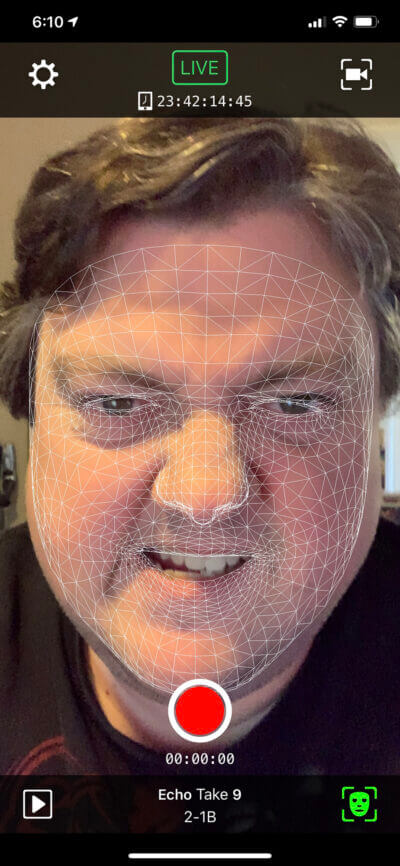


Fellowship – Epic Games has just launched the Unreal Fellowship for Film, VFX, and Animation Professionals. It is a four-week intensive remote training course that includes 94 hours of content and $10,000 stipend for each professional accepted.

Epic Games has opened applications for a new curated educational initiative called the Unreal Fellowship. This new intensive online course is designed to help industry professionals in film, animation, and VFX learn Unreal Engine, and understand the state of the art in virtual production. 50 Fellows will be accepted and able to learn leading technologies and techniques in the emerging field of real-time production. The applications will be open until Monday, July 27. You can apply at unrealengine.com/fellowship.
The whole course will be conducted entirely remotely, starting with an orientation day on Friday, August 21, and with classes running from Monday, August 24 to Monday, September 21. All of the learning tools are completely free of charge, and Epic will provide each participant with a US$10,000 stipend to ensure that they can dedicate ample time to successfully complete the rigorous curriculum.
The Unreal Fellowship builds from existing Unreal Online Learning courses for foundational skills and also offers:
With an estimated 94 hours of content along with project-based work across the four-week program, Fellows will focus on learning Unreal Engine fundamentals, model ingestion, animation, mocap integration, lookdev, lighting setups, and cinematic storytelling. The curriculum was fine-tuned earlier this year through a pilot program with 15 Fellows. The pilot program, which started in May, ran for 6 weeks. The pilot program included people such as former DNEG and Digital Domain artist David Breaux.
The pilot program brought together a range of industry professionals who, like Breaux, had strong industry experience but were not UE4 experts. “I had done some UE4 work, but not much and I burnt through that in the first 2 days, it was like we had a firehose of information,” he explained. In the pilot program, each of the Fellows had to produce their own short film, with help from the Epic and the Unreal Marketplace, which provided base assets. As each Fellow came with a different background and interest, each film was different, and “amplified their skills and backgrounds,” Breaux added. In the case of Breaux’s short film, Hunter Hunted, it reflected his skills as a character and creature animator, but most Fellows did not have such a strong and focused character animation background.
One of the many tools the team had at their disposal was the new Live Link Face iOS app, which was then in Beta, but has since been released this month. Live Link Face streams high-quality facial animation in real-time from an iPhone directly onto characters in Unreal Engine. The app’s tracking leverages Apple’s ARKit and the iPhone’s TrueDepth front-facing camera to interactively track a performer’s face, transmitting this data directly to Unreal Engine via Live Link over a network. Breaux’s film used it in many ways, but one approach particularly appealed to Breaux. He bought a stand and had the iPhone sitting up on his desk – just under his monitor screen which was running UE4. “I had a female character on-screen sort of facing a big creature, and I was able to drive the character’s face as if I was them,” he explains. “I positioned the virtual camera so it was over the shoulder of my character as she looked up at the creature, so then I could react and look at the creature – as if I was her – and directly drive her response and animation. This let me motion capture ‘her’ performance to the monster in real-time.”
While most of the short films in the pilot were narrative linear stories, the program covers all areas of virtual production, especially the huge advances in LED virtual set production, with guest speakers and detailed training material covering on set advance virtual environments. It also explored in detail sequencer driven character UE4 projects that can blur the line between a short film and advanced game cinematics. One instructor mused that Breaux’s Hunter Hunted, looked, “like a cinematic teaser for a game that has not been made yet,” and that they would not be surprised if Breaux had interest in the project from the game community as much as from the film community.
Epic has been pushing hard to make the Unreal Engine work as a film industry tool and the Fellowship program seems designed for those with serious film-making backgrounds. For example, collaborative virtual production is a particular emphasis. This is seen in the advances in asset management, shared multi-user set scouting, and with tools such as the Live Link Face app that Breaux used. The app includes multicast networking to simultaneously stream Live Link data to all machines in the Multi-User Editor session in order to minimize latency. It also has Robust timecode support and precise frame accuracy which enables seamless synchronization with other stage components like cameras and body motion capture. Live Link Face also has Tentacle Sync integration, which allows it to connect to the stage master clock using Bluetooth, ensuring an editorial line-up with all of the other device recordings from a major shoot.

The Face App was just one example of a host of tools the Epic Fellows learned and used in the course. Complex lighting gets particular attention, with senior award-winning artists and TDs providing both live lectures and personalized advice. While the COVID pandemic meant the Fellows could not go on a virtual LED set, they still immersed themselves in detailed live digital cinematography, LED technology, and lighting design. Topics covered during the course included model ingestion, animation, mocap integration, lookdev, lighting controls, and cinematic storytelling.
In the pilot program, each day would start with a virtual Agile Stand-up, via Zoom for an hour before the day’s specific training began. Fellows in the new program can expect the same bespoke instruction along with more detailed case studies from people working on major productions around the world.
“Technology can only be a great democratizer if it is freely available and empowers the people who use it,” stated Daniel Gregoire, Owner and Chairman of Halon Entertainment. “Epic not only has the first but with their Fellowship program, has taken an active path to bring professionals and luminaries into their ecosystem. This is evidence of more than a passive interest in the Hollywood community, but an active, positive force towards important storytelling and change.”
“At Epic we have always believed in the transformative power of real-time computer graphics for film and television production,” said Kim Libreri, CTO of Epic Games. “With the Unreal Fellowship, we are actively investing in visionaries who will be responsible for crafting the stories of tomorrow to ensure that they are armed with a deep understanding of the many ways that real-time technology can benefit their projects.”
Epic’s LA-based team is driving the live training and real-time collaborative components of the Fellowship. A minimum of five years of experience in commercial film and television production, immersive entertainment, or game development is required, along with the ability to commit to the Fellowship full-time for four weeks.
For more info see unrealengine.com/fellowship
Here are a few of the Fellowship Videos that people made in the pilot course.